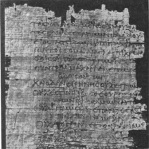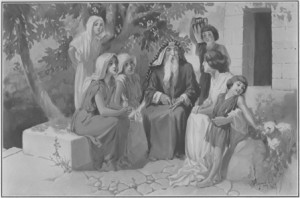From Psalms 78-79
This psalm consists of ‘dark sayings’ passed down from the fathers of Israel. Israel is in trouble. The audience must learn from these sayings if they are to continue as God’s people. The ‘saying’ is not straight away understandable. Grasping it involves telling the story of Israel and learning from the poor example of their forefathers. Today we learn about how stories can be used to teach and warn others.
This post is part of my bible in a year series.
Overview
Ps 78.1-72; Book Three; Asaph; Story of the Jews from Exodus to David
Ps 79.1-13; Book Three; Asaph; How Long, O LORD? Will you be angry forever?
Passage and Comments
One scholar has broken down the psalm into the outline below.
Introduction: vv 1–11
First Recital:
- Wilderness events vv 12–32
- gracious act (vv 12–16)
- rebellion (vv 17–20)
- divine anger and punishment (vv 21–32)
- Sequel vv 33–39
Second Recital:
- From Egypt to Canaan vv 40–64
- gracious act (vv 40–55)
- rebellion (vv 56–58)
- divine anger and punishment (vv 59–64)
- Sequel vv 65–72
(Tate, M. E. (1998). Psalms 51–100 (Vol. 20, p. 287). Dallas: Word, Incorporated.)
Because the psalm is long I will only comment on the introduction and the first recital. We can have a look at the remainder in years to come.
1 Give ear, O my people, to my teaching; incline your ears to the words of my mouth!
2 I will open my mouth in a parable; I will utter dark sayings from of old,
3 things that we have heard and known, that our fathers have told us.
4 We will not hide them from their children, but tell to the coming generation the glorious deeds of the LORD, and his might, and the wonders that he has done. (Ps 78:1–4)
The psalmist opens addressing his people. The people of Israel. He describes what he is about to say as a parable. A story gives some form of teaching. He describes his message as ‘dark sayings from of old’. This is an early indication that not all he is about to say will be easy to hear.
What he says has been passed down from their fathers. The main point of doing so is that each generation will know of the glorious deeds of the LORD. Passing on this information from generation to generation is not uncommon in the Old Testament.
Perhaps we could view it as a Hebrew form of evangelism.
Telling others about the LORD and what he has done. The psalmist begins telling the story of Israel.
5 He established a testimony in Jacob and appointed a law in Israel, which he commanded our fathers to teach to their children,
6 that the next generation might know them, the children yet unborn, and arise and tell them to their children,
7 so that they should set their hope in God and not forget the works of God, but keep his commandments;
8 and that they should not be like their fathers, a stubborn and rebellious generation, a generation whose heart was not steadfast, whose spirit was not faithful to God. (Ps 78:5-8)
Once again he reminds his audience about telling each generation of the deeds of the LORD. They have been commanded to in order that their hearers may set their hope in God and not forget his works. Its Evangelism.
The psalmist connects three concepts together. Two which are normally considered antithetical. Setting ones hope in God, remembering the works of God and keeping his commandments (Hope – Remember – Keep). They are commonly tied together in Hebrew thought.
Do you think each of these is important?
The psalmist gives a poor picture of their fathers before them. He is using them as an example of what not to be like.
9 The Ephraimites, armed with the bow, turned back on the day of battle.
10 They did not keep God’s covenant, but refused to walk according to his law.
11 They forgot his works and the wonders that he had shown them.
12 In the sight of their fathers he performed wonders in the land of Egypt, in the fields of Zoan.
13 He divided the sea and let them pass through it, and made the waters stand like a heap.
14 In the daytime he led them with a cloud, and all the night with a fiery light.
15 He split rocks in the wilderness and gave them drink abundantly as from the deep.
16 He made streams come out of the rock and caused waters to flow down like rivers. (Ps 78:9-16)
The psalmist refers to the Ephraimites using them as an example of what not to do. ‘Dark sayings from of old’ (v2). They did not keep God’s covenant and they forgot the works of the LORD even while he provided for them. He gave them abundant water to drink.
The psalmist begins to tell of Israel’s rescue from Egypt. The LORD performed wonders in Egypt and brought them out and through the Red Sea. He guided them with cloud and fire. This is their story of salvation.
But this generation did not hope, remember and keep.
17 Yet they sinned still more against him, rebelling against the Most High in the desert.
18 They tested God in their heart by demanding the food they craved.
19 They spoke against God, saying, “Can God spread a table in the wilderness?
20 He struck the rock so that water gushed out and streams overflowed. Can he also give bread or provide meat for his people?” (Ps 78:17-20)
‘Yet they sinned still more against him’. God gave them abundant water but they were not grateful or believing. They wanted food. They tested God and demanded he give them what they wanted.
Who would be so arrogant as to demand the creator of the universe to do anything for them?
They spoken against the one who saved them and provided for them. ‘Can God spread a table in the wilderness?’ The language conjures up imagery of ample food, fellowship and good times. They did not believe he could give them bread and meat even after he provided water for them. They mocked God.
Cause and effect.
21 Therefore, when the LORD heard, he was full of wrath; a fire was kindled against Jacob; his anger rose against Israel,
22 because they did not believe in God and did not trust his saving power.
23 Yet he commanded the skies above and opened the doors of heaven,
24 and he rained down on them manna to eat and gave them the grain of heaven.
25 Man ate of the bread of the angels; he sent them food in abundance.
26 He caused the east wind to blow in the heavens, and by his power he led out the south wind;
27 he rained meat on them like dust, winged birds like the sand of the seas;
28 he let them fall in the midst of their camp, all around their dwellings.
29 And they ate and were well filled, for he gave them what they craved.
30 But before they had satisfied their craving, while the food was still in their mouths,
31 the anger of God rose against them, and he killed the strongest of them and laid low the young men of Israel. (Ps 78:21-31)
God was provoked to wrath because of how they responded to his grace. They responded in unbelief and distrust. He gave them food in abundance (‘rained down’) and what they wanted. He continued to guide them. But angry as he was, he killed their strongest and their young men.
32 In spite of all this, they still sinned; despite his wonders, they did not believe.
33 So he made their days vanish like a breath, and their years in terror.
34 When he killed them, they sought him; they repented and sought God earnestly.
35 They remembered that God was their rock, the Most High God their redeemer.
36 But they flattered him with their mouths; they lied to him with their tongues.
37 Their heart was not steadfast toward him; they were not faithful to his covenant.
38 Yet he, being compassionate, atoned for their iniquity and did not destroy them; he restrained his anger often and did not stir up all his wrath.
39 He remembered that they were but flesh, a wind that passes and comes not again. (Ps 78:32–39)
The psalmist says it again. ‘In spite of all this, they still sinned’ (cf. v17). ‘Dark sayings from of old’ (v2). They continued in unbelief and he killed them.
They repented and sought God (v34). They showed signs of sincerity, but they flattered him with their mouths and lied (v36). Their hearts were the problem. Their hearts were not steadfast or faithful.
Amazingly the LORD provided atonement for them. The LORD is compassionate. He remembered how weak and temporary they were.
Story of Israel

What’s the take home value of this? Hope, remember and keep. Learn from their example. Glorify God.
God raised up a remnant of people faithful to him. They did not bow their knees to other gods. However most of Israel continued to follow the same pattern. ‘In spite of all this, they still sinned’.
The psalm and the history of Israel calls us to remember how deeply people need God to save them. Reminds us of the LORD’s saving works, abundant provision, grace and mercy.
Story of Jesus
The gospel provides us with another story of salvation. One in which the word of God became incarnate. The man Jesus Christ.
1 The beginning of the gospel of Jesus Christ, the Son of God.
2 As it is written in Isaiah the prophet, “Behold, I send my messenger before your face, who will prepare your way,
3 the voice of one crying in the wilderness: ‘Prepare the way of the Lord, make his paths straight,’ ”
4 John appeared, baptizing in the wilderness and proclaiming a baptism of repentance for the forgiveness of sins. 5 And all the country of Judea and all Jerusalem were going out to him and were being baptized by him in the river Jordan, confessing their sins. 6 Now John was clothed with camel’s hair and wore a leather belt around his waist and ate locusts and wild honey. 7 And he preached, saying, “After me comes he who is mightier than I, the strap of whose sandals I am not worthy to stoop down and untie. 8 I have baptized you with water, but he will baptize you with the Holy Spirit.”
9 In those days Jesus came from Nazareth of Galilee and was baptized by John in the Jordan. 10 And when he came up out of the water, immediately he saw the heavens being torn open and the Spirit descending on him like a dove. 11 And a voice came from heaven, “You are my beloved Son; with you I am well pleased.” (Mk 1:1–11)
Considering that we too have been saved by the mighty deeds of God in Jesus. We should also be careful to pass it on to the generations. To hope, remember and keep.
Copyright © Joshua Washington and thescripturesays, 2015. All Rights Reserved.


